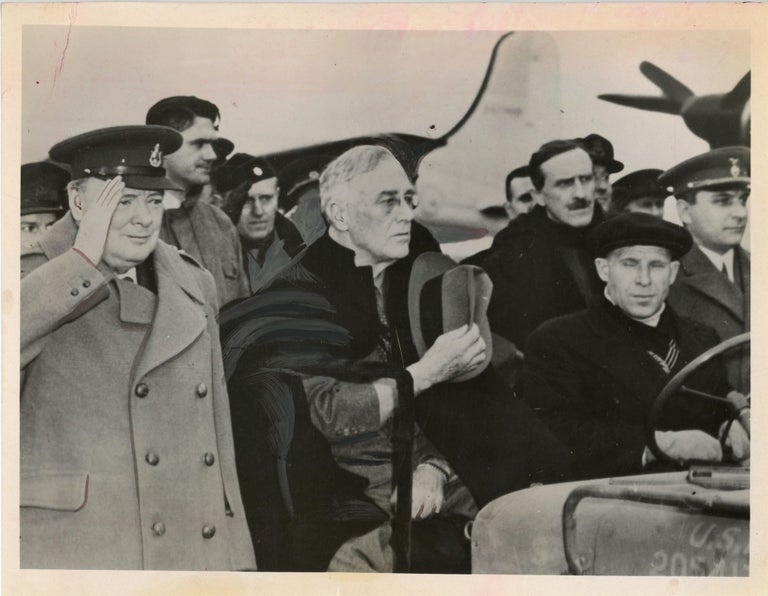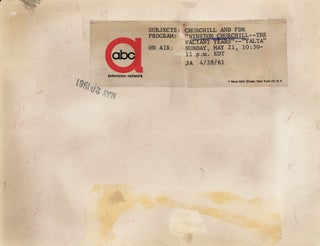A 1961 ABC television network reprint of a February 1945 image of U.S. President Franklin D. Roosevelt and British Prime Minister Winton S. Churchill at the Yalta Conference, this image used to promote a 1961 documentary about Churchill
New York: ABC Television Network, 1961. Photograph. This is a 1961 reprint of a Second World War photograph featuring British Prime Minister Winston S. Churchill and U.S. President Franklin D. Roosevelt at the Yalta conference, held from 4 to 11 February 1945 – the final months of the war in Europe, of FDR’s life, and of Churchill’s wartime premiership. The gelatin silver print measures 9 x 7 inches (22.9 x 17.8 cm). This image was produced for ABC television network in 1961 to promote an episode of their documentary of Churchill.
Condition is good, the image clear despite superficial scratches visible under raking light, a crease at the upper left corner, and light wear to extremities. Art department retouches are evident to Roosevelt’s cloak and limning his head. A printed caption on a label affixed to the verso indicates that this image was produced to promote the 1961 ABC television documentary “Winston Churchill – The Valiant Years”. The “abc television network” label indicates that this image was specifically intended to promote the “YALTA” episode airing “SUNDAY, MAY 21, 10:30-11 p.m. EDT”. A further inkstamp on the verso is dated “MAY 20 1961”.
The Yalta Conference, also known as The Crimea Conference, was held at the Livadia Palace near Yalta in the Crimea from 4-11 February 1945. This conference proved a geopolitically defining event of the 20th Century, fundamentally shaping the postwar world and drawing the battle lines of the long Cold War to come. A conventional perspective is that Roosevelt - terminally ill and trusting - viewed massive concessions to Stalin as a hopeful path to lasting peace. By contrast, Churchill deeply distrusted Stalin's character and motivations, but had little power to resist the tide of Roosevelt's rash concessions and groundless optimism. Perhaps better informing this simplified characterization, “The central, ever-present fact lying behind everything was that Stalin had an army of more than six million men in eastern Europe, including by then in every region of Poland. The Western Allies thought they needed Russia to declare war against Japan once the German war was over, as they could not be certain that the atomic bomb – which for obvious reasons was not mentioned – actually worked.”
Another constraining imperative was that “Churchill and Roosevelt wanted the Russians to engage meaningfully in the United Nations”. In sum, “There was idealism at Yalta as well as Realpolitik, but there was also lethal decision-making” and, for better and worse, the “Big Three... remade the world in eight days”. There continue to be many ways to regard the competing imperatives and unsavory compromises of Yalta. One might choose to draw inferences from the fact that, “on the 11th Churchill suddenly decided, while giving no reason, that he wanted to leave… immediately, despite being scheduled to leave the next day. He gave his secretarial and household staff only one hour to pack everything up and be off”. (Roberts, Walking With Destiny, pp.859-863)
Perhaps the disappointments of both Yalta and the Second World War are best encapsulated by Poland. In September 1939, Britain had declared war on Nazi Germany when Poland was invaded. In the aftermath of the world’s most dire conflict, Poland was liberated from Nazi occupation and oppression only to be lost to Soviet control. Two weeks after Yalta, Churchill remarked late at night to his private secretary: ‘I have not the slightest intention of being cheated over Poland, not even if we go to the verge of war with Russia.’” (Gilbert, VII, p.1238) As it turned out, it was not an either/or proposition, but rather both; Poland spent nearly half a century as part of the Soviet Empire and the west spent nearly half of the twentieth century on that verge of war with Russia. Item #006146
Price: $150.00


